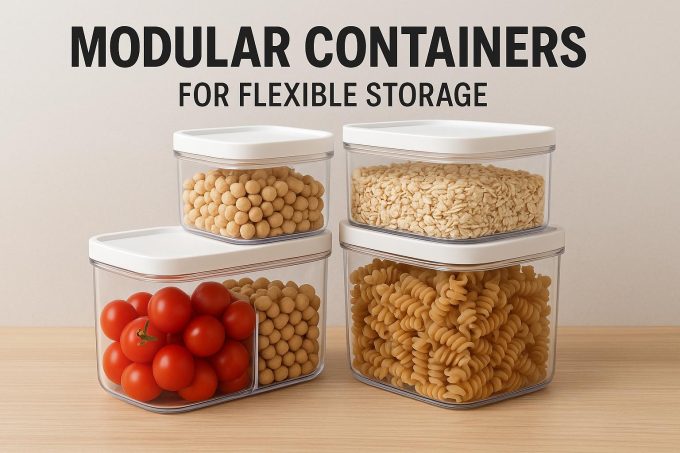Introduction to Modular Containers
Modular containers are an innovative solution for flexible storage needs. These containers are designed to be adaptable and can be easily reconfigured to meet various requirements. The increasing demand for efficient storage solutions in both residential and commercial spaces has led to the popularity of modular containers. Their ability to optimize space usage and cater to specific storage needs makes them ideal for a wide range of applications.
Features of Modular Containers
One of the standout features of modular containers is their versatility. These containers can be customized to different sizes and configurations based on the user’s needs. They often come with interlocking systems or stackable designs that allow for easy assembly and disassembly. This makes them not only practical but also convenient for users who need to frequently modify their storage layouts.
Another important feature is their durability. Modular containers are typically made from strong materials such as metal, plastic, or wood, ensuring longevity and resistance to wear and tear. This durability is particularly essential for commercial applications where the containers may be subjected to more intensive use.
Adaptability and Versatility
Modular containers excel in providing adaptability in various settings. A key aspect of their versatility is their ability to be configured in numerous ways to fit specific spaces and purposes. This can involve altering their dimensions or integrating complementary components that expand their usage. For example, modular containers might include adjustable shelves, partitions, or compartments, allowing users to create a storage system that precisely matches their needs. This feature greatly enhances their usability in places with limited space.
Material Composition
The composition of modular containers contributes significantly to their robustness and versatility. Materials such as reinforced plastic provide lightweight yet sturdy options for easy handling and mobility. Metal, particularly steel, offers high strength and is ideal for industrial settings where heavier items may be stored. Wood provides an aesthetically pleasing option, blending functionality with decor, especially in residential settings. Each material has its advantages and can be selected based on specific contextual needs, such as the type of goods stored and the environmental conditions.
Applications
Modular containers are widely used in various sectors. In the residential sector, they are ideal for small apartments or homes where space is limited. Homeowners often use them for organizing clothes, toys, kitchenware, and other household items. In contrast, the commercial sector utilizes modular containers for organizing office supplies, tools, or inventory in warehouses.
Their application extends into temporary structures, such as pop-up shops, exhibition stands, or even emergency shelters. These containers can be customized to quickly create functional and efficient spaces without the time and resources involved in conventional construction processes.
Retail and Industrial Use
Industries also benefit from modular containers. They are particularly popular in retail, where they help manage stock efficiently, and in industrial settings for storing equipment or raw materials. The ability to tailor these containers to specific storage requirements makes them incredibly useful across various domains. Retail stores often use modular containers to design flexible back-room storage solutions that can be adjusted as per inventory changes.
For industrial applications, modular containers serve as a convenient option to store large equipment and machinery. Their durable construction can sustain the rigors of heavy industrial activity while keeping items safely stored and easily accessible when needed.
Advantages
Modular containers offer numerous advantages, making them a preferred choice for many. They provide flexibility in storage management, allowing users to adjust their arrangements as necessary. This is particularly beneficial in dynamic environments where storage needs can frequently change.
Additionally, modular containers contribute to cost savings. Their durability means less frequent replacements, and their ability to be reconfigured reduces the need for purchasing additional storage units. This adaptability also facilitates better organization, leading to improved space utilization and productivity.
Efficiency and Productivity
The benefit of improved organization cannot be overstated. With items neatly stored and categorized, the ease of finding and retrieving goods saves time and enhances workflow efficiency. This is especially critical in business operations where time equates to profit. The organized approach enabled by modular containers fosters a more efficient environment, significantly impacting productivity.
Considerations
While modular containers offer great benefits, there are some considerations to keep in mind. The initial cost may be higher than more traditional storage solutions, but this can be offset by their durability and flexibility over time. Choosing the right material is crucial depending on the environment in which the containers will be used. For example, if they will be located in a humid area, selecting a material resistant to moisture is recommended.
Another factor to consider is the weight load capacity, especially in industrial applications where heavy machinery might be stored. It’s important to account for the maximum load the containers can bear to ensure safety and longevity.
Environmental Impact and Sustainability
Finally, the environmental impact of modular containers is an important consideration. Many manufacturers are focusing on sustainable production by using recyclable materials and eco-friendly processes. Opting for such products not only aids in reducing environmental degradation but also appeals to entities looking to maintain or enhance their sustainability profiles.
For more information on modular containers or to explore various options available, refer to this website for in-depth resources and product offerings.

